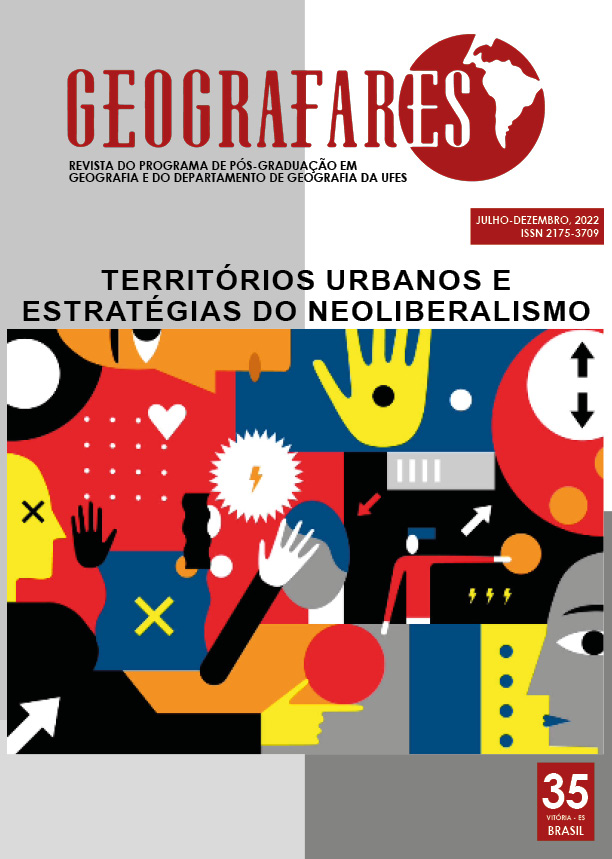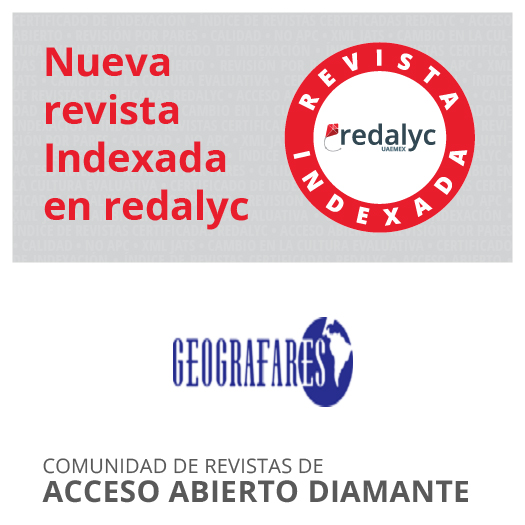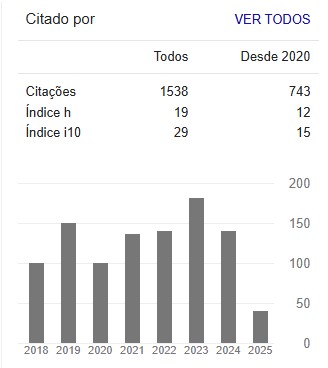Modes d'échange, métabolisme et formations sociales: apports du cadre théorique de Kojin Karatani pour penser la dimension spatiale
DOI :
https://doi.org/10.47456/geo.v2i35.38483Mots-clés :
métabolisme, modes d'échange, GéographieRésumé
Philosophe marxiste et critique littéraire, Kojin Karatani est largement considéré comme l'un des théoriciens japonais les plus importants de notre époque. Ses perspectives novatrices ont commencé à être diffusées dans le débat universitaire occidental lorsque certaines de ses œuvres ont été traduites en anglais. Les arguments contenus dans son livre The Structure of World History ont été mis en lumière, dans lequel l'auteur propose des relectures de certaines catégories marxiennes mises en perspective dans une tentative de réinterprétation de l'histoire universelle. Sa proposition de traiter des modes d'échange et sa récupération du concept de métabolisme pour décrire la relation établie entre la société et la nature, par exemple, font partie de ses apports. En ce sens, le présent article entend présenter de manière résumée certaines des idées contenues dans le schéma de Karatani, en cherchant à indiquer comment elles pourraient être mobilisées pour contribuer à certains débats en géographie.
Téléchargements
Références
BARBOUR, Charles. The structure of world history: From modes of production to modes of exchange. Contemp Polit Theory, n. 16, 2017, 290–292. Disponível em: https://doi.org/10.1057/cpt.2016.19. Acesso em: 02 jun. 2022.
CASTREE, Noel. Marxism and the Production of Nature. Capital & Class, v. 24, n. 3, p. 5-36, out. 2000. Disponível em: http://dx.doi.org/10.1177/030981680007200102. Acesso em: 31 mai. 2022.
FOSTER, John Bellamy. Marx's Theory of Metabolic Rift: classical foundations for environmental sociology. American Journal Of Sociology, v. 105, n. 2, p. 366-405, set. 1999. Disponível em: http://dx.doi.org/10.1086/210315. Acesso em: 31 mai. 2022.
FOSTER, John Bellamy; CLARK, Brett. Marx’s Universal Metabolism of Nature and the Frankfurt School: Dialectical Contradictions and Critical Syntheses. In: ORMROD, James S. (Org.) Changing Our Environment, Changing Ourselves. London: Palgrave MacMillan, 2016, 101–35.
HILLANI, Allan M.; TUPINAMBÁ, Gabriel.; CARON, J.-P.; MILLIE, J.; SILVEIRA, Maikel da; PEDROSO, Rafael; SALDANHA, Rafael.; NADERI, Reza; BARBE, Renzo; GUIDI, Tiago; SHULKIN, Yasha; YAO, Yuan. Atlas of Experimental Politics (reduced version). Ljubljana: ŠUM Journal, 2021. Disponível em: https://www.academia.edu/67951135/Atlas_of_Experimental_Politics_reduced_version_. Acesso em: 31 mai. 2022.
JAMESON, Fredric R. Ancient Society and the New Politics: from Kant to Modes of Production, Criticism: v. 58, n. 2, 2016 Disponível em: http://digitalcommons.wayne.edu/criticism/vol58/iss2/8. Acesso em: 31 mai. 2022.
KARATANI, Kojin. An Introduction to Modes of Exchange. Kojin Karatani (Officil Web Site), 2017. Disponível em: http://www.kojinkaratani.com/en/pdf/An_Introduction_to_Modes_of_Exchange.pdf. Acesso em: 31 mai. 2022.
KARATANI, Kojin. The structure of World history: from modes of production to modes of Exchange. Durham: Duke University Press, 2014.
KARATANI, Kojin; WAINWRIGHT, Joel. Critique is impossible without moves: Na Interview with Kōjin Karatani. Dialogues in Human Geography v. 2, n. 1, p. 30-52, 2012. Disponível em: https://journals.sagepub.com/doi/abs/10.1177/2043820612436923. Acesso em 31 mai. 2022.
RICHTER, Steffi. Review of Karatani, Kojin, The Structure of World History: From Modes of Production to Modes of Exchange. H-Asia, H-Net Reviews. April, 2015. Disponível em: http://www.h-net.org/reviews/showrev.php?id=42393. Acesso em: 31 mai. 2022.
SMITH, Neil. Uneven development: nature, capital, and the production of space. Athens (Georgia): The University of Georgia Press, 2008.
WAINWRIGHT, Joel. The Spatial Structure of World History. Journal of Japanese Philosophy n. 4, p. 33-59, 2016. Disponível em: https://www.pdcnet.org/collection/show?id=jjp_2016_0004_0033_0059&file_type=pdf. Acesso em 31 mai. 2022.
WARK, McKenzie. All Power to the {Historical} Imagination! Public Seminar, 4 jan. 2015. Disponível em: http://publicseminar.org/2015/01/karatani/. Acesso em: 31 mai. 2022
Téléchargements
Publiée
Numéro
Rubrique
Licence
Autores que publicam nesta revista concordam com os seguintes termos:- Autores mantém os direitos autorais e concedem à revista o direito de primeira publicação, com o trabalho simultaneamente licenciado sob a Licença Creative Commons Attribution que permite o compartilhamento do trabalho com reconhecimento da autoria e publicação inicial nesta revista.
- Autores têm autorização para assumir contratos adicionais separadamente, para distribuição não-exclusiva da versão do trabalho publicada nesta revista (ex.: publicar em repositório institucional ou como capítulo de livro), com reconhecimento de autoria e publicação inicial nesta revista.
- Autores têm permissão e são estimulados a publicar e distribuir seu trabalho online (ex.: em repositórios institucionais ou na sua página pessoal) (Veja O Efeito do Acesso Livre).




























